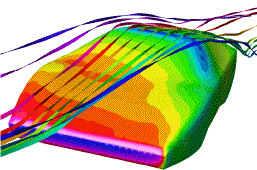15-853: Algorithms in the "Real World"
Carnegie Mellon University, Computer Science Department
Fall 2007

- Instructors:
Guy Blelloch
- Time: Tuesday and Thursday 10:30 - 11:50
Note: first class is September 11
- Place: 4623 Wean Hall
- Credit: 12 Units
- Prerequisites: An advanced undergrad course in algorithms
(15-451 or equivalent will suffice).
- Office Hours: Monday 1:30-2:30pm
Course Overview:
This course covers how algorithms and theory are used in "real-world"
applications. The course will cover both the theory behind the
algorithms and case studies of how the theory is applied. It is
organized by topics and the topics change from year to year.
This year we will cover the following topics. The exact subtopics
might change
Requirements and Grading Criteria
Assignments
Relevant Books
See the lists within each of the topic pages
Guy Blelloch,
guyb@cs.cmu.edu.

